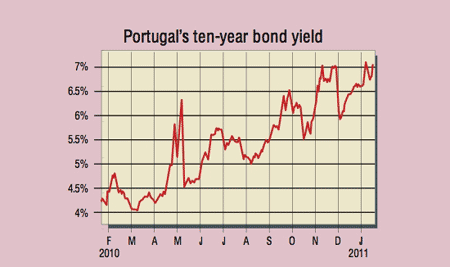
There was widespread relief last week when Portugal, widely seen as on the verge of asking the EU/IMF for a bail-out amid fears that it would be shut out of the debt markets, managed to raise ten-year paper at a lower-than-expected interest rate of 6.7%. But early this week, Portugal’s ten-year yield crept back up over 7%. Spanish yields also rose.
Europe’s bail-out strategy, designed to calm markets and stem contagion, isn’t working. Investors have started to worry about Spain, Belgium and Italy. The problem, as Matthew Lynn points out on Bloomberg.com, is that the rescue mechanism makes it no easier for countries to make a dent in their debt piles. Interest rates for loans from the rescue fund have been set quite high – 5.5% for Ireland – to avoid making the fund appear to be an easy way out for cash-strapped governments. The upshot is “premium rates on yet more debt”.
And piling on more loans through a rescue fund can’t fix the underlying problem. The periphery looks trapped in a spiral: stringent austerity hampers growth, worsening the public finances, increasing debt, and necessitating more austerity. The ongoing dispute about enlarging the rescue fund misses the key point, says Die Welt: defaults are inevitable.
So we may as well get on with restructuring the debt of “plainly insolvent” countries right now, says The Economist. The only alternative would be for the core – Germany – to underwrite the periphery’s debts through fiscal union, which “seems to be a political non-starter”.
The debt burden in the rescued countries is mounting rapidly and “at some point it will become politically impossible” for peripheral governments “to demand more austerity to pay off foreigners”. That implies that a sudden default is an ever-present threat. So the longer the delay, the “bigger the problem and the more disorderly” the restructuring process will be, says Mohammed El-Erian, co-CEO of Pimco.
It wouldn’t be easy, and it would certainly spook markets because investors would fear major losses at banks. Nevertheless, with “deft technical management and political courage”, it’s feasible, reckons The Economist. Indeed, it is the least-worst option, agrees Die Welt. But until it is seriously considered in Brussels, the euro crisis will drag on and on.